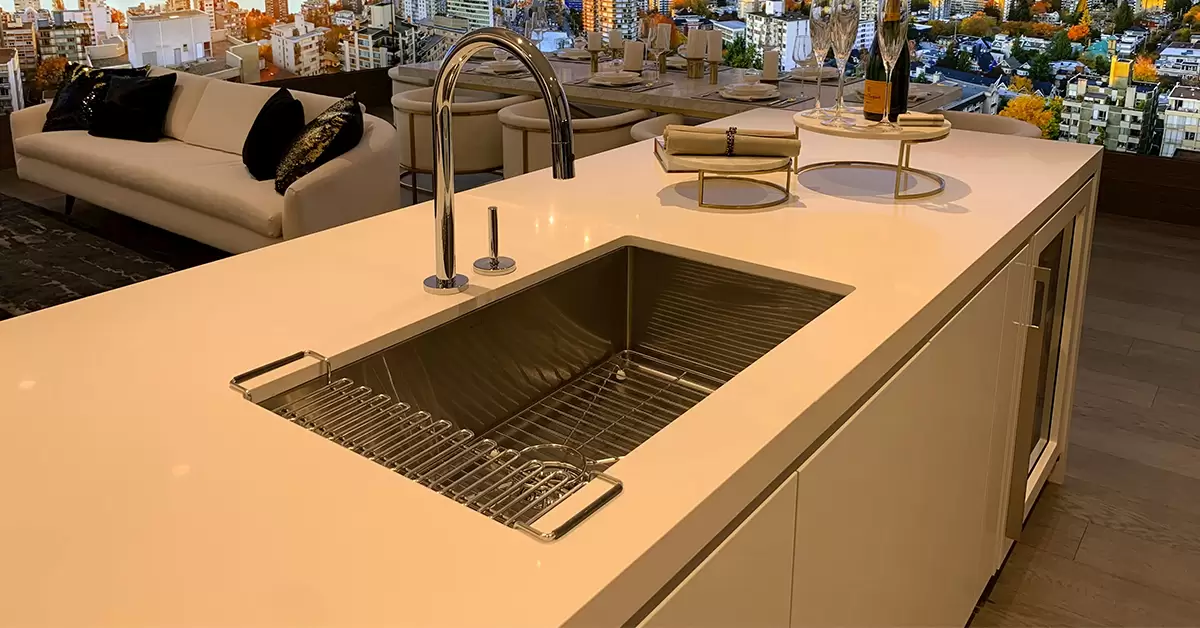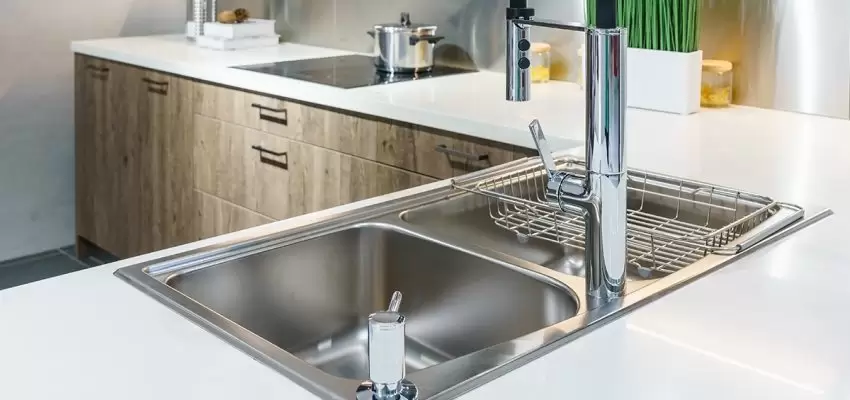The kitchen is often called the “heart of the home” – and the sink is certainly at the heart of every kitchen. As a highly utilized fixture prone to messes, your kitchen sink endures heavy use over time. Finding the optimal sink that pairs durability, stylish design and handy features is key to keeping your food prep and cleanup tasks running efficiently for years on end. Follow this comprehensive guide covering sink types, materials, dimensions, mount styles, and value-adding accessories to make the perfect kitchen sink selection for your home.
Post your Requirement
| Term | Definition |
| Kitchen Sink |
A plumbing fixture typically installed in a kitchen for washing dishes, utensils, and food preparation, consisting of a basin and drain, usually made of stainless steel, ceramic, or composite materials. |
| Kitchen Sink Online |
The availability of kitchen sinks for purchase through online platforms or e-commerce websites offers convenience and a wide selection of styles, sizes, materials, and brands to choose from. |
| Kitchen Sink Price |
The cost associated with purchasing a kitchen sink varies based on factors such as material, size, design, brand, features (e.g., single or double basin, depth), and the retailer’s pricing strategy. |
| Best Kitchen Sink |
A kitchen sink is highly regarded for its quality, durability, functionality, design, ease of maintenance, and overall customer satisfaction, often determined through reviews, ratings, and expert opinions. |
Kitchen Sink Types

Kitchen sinks generally fall into one of these configuration categories:
| Type | Description |
|
Single Bowl Kitchen Sink |
A kitchen sink with only one bowl, suitable for smaller kitchens or where space is limited. It provides ample space for washing large items like pots and pans and is generally easier to clean and more affordable than double-bowl sinks. |
|
Double Bowl Kitchen Sink |
A kitchen sink with two separate bowls, offering flexibility to users for multitasking or separating tasks such as washing and rinsing dishes. Available in various sizes, depths, and configurations to suit different needs and preferences. |
| Farmhouse Basin |
Also known as apron front basins, these sinks feature a forward-facing extension that replaces the counter, providing a country-style or traditional look. Available in single or double bowl forms, though single bowls are more common. Generally expensive. |
|
Undermount Kitchen Sink |
Installed underneath the counter without a rim or lip along the edges, giving a seamless look to the kitchen. While easy to clean and aesthetically pleasing, they can be expensive and require professional installation, especially for heavier materials like iron or fireclay. |
| Corner Kitchen Sink |
Double bowl sinks are installed at the corner of the counter, offering convenience and maximizing corner space. However, installation costs can be high due to the need for special cuts in the counter. |
| Modular Kitchen Sink |
Offers a luxurious and modern appearance, suitable for modular kitchens. Available in various configurations including single bowl, double bowl, corner, and under-mount. However, installation and maintenance costs tend to be high. |
Materials and Durability
From rugged stainless steel to easy-clean porcelain to stylish solid surface materials, sink materials impact durability, maintenance, and cost.
- Stainless Steel: A top choice for kitchens, stainless resists corrosion, stains, and dents with good longevity at various gauge thicknesses and percentages of alloys. It withstands heat and offers a sleek, modern look. But lower grades may scratch over time.
- Enameled Cast Iron: Preferred for farmhouse sinks, enameling creates a glass-like facelift over durable cast iron. Beautiful and extremely scratch-resistant, but prone to chipping from fallen cookware. It must be handled with care.
- Solid Surface: Made of blended natural minerals and high-tech acrylic resins, these solid non-porous sinks homogeneously fuse to countertops of the same material for sleek integration. It has a seamless appearance but is expensive.
- Composite: Blends crushed stone, metals, and resins to form an ultra-tough sink basin impervious to scratches, stains, and dents while offering sound-dampening qualities. Provides style and strength.
Undermount vs Top-Mount Installation
Installation style impacts the sink’s transition seamlessness with surrounding countertops. Undermount sinks fasten below counter edges for an elegant, streamlined appearance easier to wipe down since accumulating crumbs or grime bypass sink rims. But installation is complex, limiting later sink replacement.
Conversely, top-mount or “drop-in” sinks rest atop the counter opening for simpler DIY projects and future sink changeouts. Yet visible rims catch debris and slightly disrupt workspace continuity.
Added Features
Secondary sink characteristics that amplify functionality include grooves to facilitate draining, sloped basin floors, tiered levels, ledges to accommodate cutting boards, accessories like racks or drain trays, soundproofing, and touchless faucet capability. Decide which extras suit your workflow habits.
Size Considerations
Measure existing cabinet openings or new kitchen plans to determine sink sizing limitations. Most kitchen sinks range 20-30 inches wide and 16-23 inches front-to-back as sufficient to handle pots and pans cleaning. Depth typically falls between 7-10 inches. Farmhouse sinks trend larger given furniture-style builds at 25-33 inches wide and 8-11 inches deep. Scale sink size to your kitchen traffic and the scope of dirty dishes generated.
Conclusion
Doing some homework on sink types, installation modes, materials, and sizes for your kitchen layout allows you to hone in on the perfect model to meet both form and functional requirements. Seeking design and usage advice from kitchen remodeling contractors also helps fit a sink suited for food prep habits. Procuring the right sink along with a reliably durable faucet means you’ll enjoy smoothly operating the heart of your kitchen for decades on end.























Post A Comment